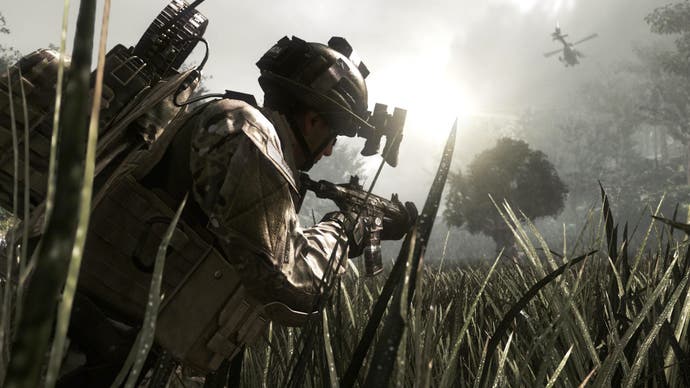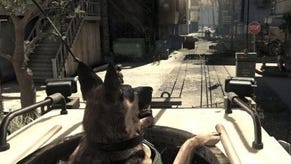Call of Duty: Ghosts dedicated servers confirmed for Xbox One and PC, but what about PlayStation and Xbox 360?
Xbox Live cloud part of broader initiative to improve matchmaking for all.
Infinity Ward has confirmed dedicated servers for the Xbox One and PC versions of Call of Duty: Ghosts, but what about other platforms?
During Microsoft's Gamescom media briefing this week Infinity Ward executive producer Mark Rubin announced the Xbox One version of the upcoming shooter would benefit from dedicated servers powered by the Xbox Live cloud in a similar fashion to Respawn's Titanfall.
In an interview with Eurogamer following the announcement, Rubin confirmed dedicated servers for the PC version also - but wouldn't be drawn on PlayStation 4, PlayStation 3 or Xbox 360.
"Those [Xbox One and PC] are the only platforms we're talking about at the moment," Rubin said. "So, watch this space!"
Microsoft's 300,000 server Xbox Live Cloud is a subset of Microsoft's Azure platform. The part reserved for Xbox Live is called Thunderhead, which can only be used for Xbox One - not PC or even Xbox 360.
While Rubin wasn't able to go into detail on how Ghosts will work on the cloud (in-game you'll connect in the same way you're used to, except you're connecting to dedicated servers), he did provide interesting insight into how the decision to use it came to be.
"Very early in the project we had a bunch of meetings with Xbox, where they'd come in, a few engineers and their representatives, and they'd start telling us about what the Xbox One was going to be," Rubin said, "what the specs were at the time - they change over time - what some of the plans were, some of the features, Kinect, online, all that sort of stuff. They started giving us the brain dump of everything they knew they were aiming for.
"Information comes in batches. They don't necessarily know everything all at once. And one of those meetings was the talk of the Xbox Live Cloud. We perked up at that. They weren't prepared to answer all our questions, but we were grilling them, asking, what does it mean? What does it do? What's the coverage? How many servers? What's the throughput? We just kept going and going and going, and they were like, we have no idea how to answer those questions. It doesn't exist yet. We'll get back to you.
"So we dropped it for a while. Then it came back, and we had details on Xbox Live servers and the cloud. Then we sat with that information and studied it, and tried to figure if this was something that could work for us. We felt, yes, this will help us. We can do dedicated servers off of it and we think it will make for a better experience for people.
"We ended up pulling the trigger probably only a couple of months ago. The cloud service they're offering hadn't completely formed yet. But we pulled the trigger, and now I've announced it so now I have to do it."
""The internet isn't ours. We don't own it. We don't get to control it. We don't design it. We're learning amazingly crazy things about how the internet works."
Infinity Ward executive producer Mark Rubin
Use of the Xbox Live cloud for dedicated servers is just one part of a broader initiative within Infinity Ward to improve the gamer connection.
Rubin said an engineer once told him handling multiplayer is not only the hardest thing to do in video games, but in all of coding engineering. "Working on netcode is harder than rocket science," he said.
"The internet isn't ours. We don't own it. We don't get to control it. We don't design it. We're learning amazingly crazy things about how the internet works."
Infinity Ward was able to improve the Call of Duty netcode after working with some gamers who had complained about "crappy connections".
"It was a guy and his cousin who lived in the same neighbourhood," Rubin explained. "They were literally houses away, but one guy had one ISP and the other guy had a different ISP.
"They would matchmake with a friend of theirs who was on the other side of the town, and they would have an inconsistent, crappy connection. They were like, we're right next to each other. How is it me and my cousin have such a bad connection?
"We did trace routes and found the other player they would play with was on the same ISP as the main guy we were talking to. That ISP would generally have a short hop. But this other guy, who's in the same local vicinity, so the IP addresses would put them together as, oh, you guys are good together, his hops were actually going way outside the city and then coming back.
"What we found was, it's really not your physical location that's determining how good your connects are. Even if we're next door to each other, we might be miles apart as far as internet connections are concerned."
"It's really not your physical location that's determining how good your connects are. Even if we're next door to each other, we might be miles apart as far as internet connections are concerned."

For Ghosts, Infinity Ward has implemented new technology to measure internet connection distance rather than physical distance - and these changes will benefit all versions of the game.
"We're hoping to see some really good improvements in just matchmaking people with people who have a better connection to each other."
Another issue Infinity Ward faces has to do with the ISPs themselves not reporting accurately players' location. Apparently Europe in particular has a huge problem with this.
Rubin mentioned a London-based ISP, which remains nameless, that registers its location as France. Another UK ISP is registered in the Isle of Man.
"It was like, whoa! We have 500,000 people playing in the Isle of Man!" Rubin laughed. "Hmm. No we don't.
"But we saw people, especially in the UK, who were getting matchmade with people in France, and they were always complaining. We found out it's because your ISP tells us you're in France. We can't control that. We have no control whatsoever of where your ISP tells us where you are. It's up to them to tell us.
"We're experimenting with ways around that, of not asking your location but rather measuring your location hop wise."











